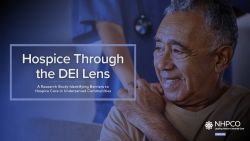NHPCO Publishes Hospice Through the DEI Lens Research Report
For Immediate Release
December 13, 2022
 The National Hospice and Palliative Care Organization (NHPCO) Diversity Advisory Council (DAC) published the results of a first-of-its-kind research exploring perceptions of hospice care among African American/Black, Hispanic/Latino, and LGBTQ+ communities. This survey of 1,200 people is part of the NHPCO DAC’s commitment to health equity; to understanding hospice through the lens of diversity, equity, and inclusion (DEI); and to breaking down breaking down barriers to accessing hospice and palliative care through knowledge sharing, data collection, and collaborative discussion. Along with key research findings, the Hospice Through the DEI Lens report offers recommendations for hospice providers to help increase understanding of hospice care and help overcome barriers to access. In releasing the findings, the NHPCO DAC also noted its intention to expand this research in 2023 to include additional populations.
The National Hospice and Palliative Care Organization (NHPCO) Diversity Advisory Council (DAC) published the results of a first-of-its-kind research exploring perceptions of hospice care among African American/Black, Hispanic/Latino, and LGBTQ+ communities. This survey of 1,200 people is part of the NHPCO DAC’s commitment to health equity; to understanding hospice through the lens of diversity, equity, and inclusion (DEI); and to breaking down breaking down barriers to accessing hospice and palliative care through knowledge sharing, data collection, and collaborative discussion. Along with key research findings, the Hospice Through the DEI Lens report offers recommendations for hospice providers to help increase understanding of hospice care and help overcome barriers to access. In releasing the findings, the NHPCO DAC also noted its intention to expand this research in 2023 to include additional populations.
Key findings and recommendations include:
-
-
- Finding: Across all populations surveyed, large percentages of respondents agree that “Doctors often wait too long to talk about hospice,” leading to a “crisis decision.” That sentiment is particularly pronounced among LGBTQ+ respondents, 44% of whom strongly or somewhat agree.
-
- Recommendations: Hospice providers should offer in-services to healthcare providers on how to have conversations about hospice with patients and families and share this data set with referral partners.
-
- Finding: Compared to White (52%) respondents, Black (39%) and Hispanic (41%) respondents are less likely to be aware that hospice is a benefit covered by Medicare.
-
- Recommendations: Black and Hispanic caregivers should be advised early on of the hospice benefits offered by Medicare, as well as the typical costs of hospice for those with Medicaid or private insurance. Ensure understanding that hospice is an at-home option that is covered by their benefits. Clearly explain how the Medicare hospice benefit works. This can be on the hospice organization’s website AND printed collateral.
-
- Finding: Compared to White respondents, Black respondents are significantly more likely (21% vs 11%) to feel more comfortable with hospice workers who are the same ethnicity as their loved one.
-
- Recommendations: The desire for cultural similarity further underscores the need for diversity at all levels of hospice staff and leadership. Prioritize your organization’s commitment to culturally proficient care and give concrete examples of what you’re doing in both internal and external communications. Provide ongoing education to your staff to address cultural issues important to your community.
-
- Finding: Among Hispanic/Latino communities, language can be a significant barrier for non-native English Speakers. More than half (52%) of Hispanic respondents said that in order to feel comfortable they would need hospice workers who spoke their loved one’s language.
-
- Recommendations: Written materials (both print and digital) should be available in a variety of languages. Even if a patient and/or their loved ones can read English, offering materials in their native language, and in a culturally appropriate way, demonstrates a commitment to honoring their culture. Diversity of language is a key component to overall diversity. Hospice organizations should ensure language diversity that mirrors that of their patient population. Develop best practices for engaging with interpreters to ensure all communications maintain the qualities of care and compassion.
-
- Finding: Nearly 1/3 of LGBTQ+ respondents doubt or are unsure that hospice would respect their sexuality.
-
- Recommendations: Prospective LGBTQ+ clients need reassurance that they will be treated with respect. Consistently collect patient demographic information, including gender identity and preferred pronouns.
-
- Finding: Across all populations surveyed, large percentages of respondents agree that “Doctors often wait too long to talk about hospice,” leading to a “crisis decision.” That sentiment is particularly pronounced among LGBTQ+ respondents, 44% of whom strongly or somewhat agree.
-
NHPCO COO and Interim CEO, Ben Marcantonio, said, “Even as hospice uptake has grown nationally for the last two decades, we continue to see that White Americans chose hospice at higher rates than Hispanic, Black, Asian, and Native Americans. While national data sets are not available to get a full picture of hospice uptake by sexual or gender identity, we know anecdotally that many LGBTQ+ individuals have significant hesitancies when it comes to hospice. NHPCO members are committed to improving equitable access to care for all communities, and we are pleased to be able to provide resources like this report to help advance the national conversation.”
NHPCO DAC Chair, Nicole McCann-Davis, said, “The Hospice Through the DEI Lens report offers fresh insights and practical advice for hospice providers to continue improving equitable access to culturally competent care in their communities. Regardless of where a provider is in their health equity journey, there are recommendations for everyone. The report also adds to a slate of resources available at nhpco.org/diversity. Out of NHPCO’s commitment to diversity, equity, and inclusion as a public good, we make the most of these resources available to both members and non-member organizations.”
To access the report and other NHPCO DEI resources, visit nhpco.org/diversity.
